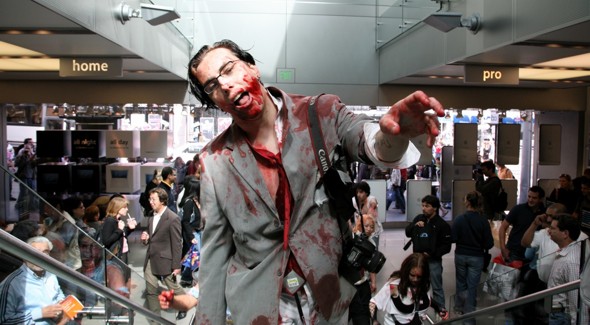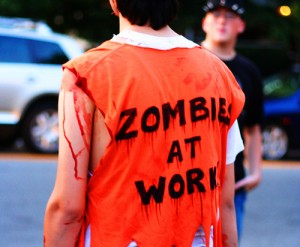Today, we present a guest post from ShadowBanker of the excellent blog Ecocomics. As I mentioned in last week’s open thread, we’re big fans here. Along the lines of a couple of our podcast episodes, it presents simple, rational tools for understanding the hordes of undead ravaging the post-apocalyptic world looking for delicious, delicious brains. Enjoy!
Suppose that in 2010 there is a major zombie apocalypse. Inexplicably, corpses all over the world reanimate and hunt the human race in search of fresh brains. Now, assume that after years of struggle, the human race prevails and the zombies have been contained on the island formerly known as New Zealand. What now? What happens after the great zombie wars?
Tens or hundreds of thousands of people will be converted or killed (perhaps millions). This significant depopulation would almost surely engender a significant dent in the global economy. As an analogous example, consider the Black Death. This plague had claimed anywhere between 75 and 200 million people in Europe in the 14th century and magnified a recession that had started earlier in the century. Farm production and output had greatly diminished. Cheap labor was in high demand by landowners, who competed by offering higher wages. However, governments had instituted regulations that restricted peasants from earning higher wages or leaving their current positions. While quality of life did improve for many peasants (more food, higher wages, etc.), there was still much work to be done to straighten out the dent in Europe’s economy.
Yet, all hope is not lost. Despite all the carnage, death and economic declines that would follow from a zombie apocalypse, the nations of the world could still benefit by integrating the remaining zombies into their economic and social infrastructures.
 In the 2004 film Shaun of the Dead, some zombies bagged groceries at supermarkets, some competed in televised athletic shows (similar to Nickelodeon’s Legends of the Hidden Temple), and others even kept friends company. In the 2006 Canadian film, Fido, a company called Zomcon actually crafted a device to control zombies’ hunger. Individuals and businesses would then purchase tamed zombies, which would either act as employees in firms or as household servants. Obviously, a zombie would not possess the mental capacity to perform rocket surgery, but you could surely hire one to work in your factory or paint your fence.
In the 2004 film Shaun of the Dead, some zombies bagged groceries at supermarkets, some competed in televised athletic shows (similar to Nickelodeon’s Legends of the Hidden Temple), and others even kept friends company. In the 2006 Canadian film, Fido, a company called Zomcon actually crafted a device to control zombies’ hunger. Individuals and businesses would then purchase tamed zombies, which would either act as employees in firms or as household servants. Obviously, a zombie would not possess the mental capacity to perform rocket surgery, but you could surely hire one to work in your factory or paint your fence.
This has some important implications for the economy. Zombies represent a source of cheap labor and a particularly lucrative source being that they are infinitely undead. They don’t require any upkeep—no food to survive assuming the government has found a way to curb their hunger, no wages, no health care, no benefits, etc.
In fact, rather than labor, one can view zombies as inexpensive factory tools, which require no maintenance or upgrades. If a government were to permit the use of zombies in the private sector, businesses would see marked improvements in their annual production levels, GDP would gradually rise, and the economy might stabilize more quickly.
However, there is an even greater implication that film and literature have not directly addressed (as far as I am aware). The situation described above implies that human beings have discovered the secrets to eternal life—the mystery that philosophers, theologians, biologists and others have been attempting to describe throughout man’s existence. The answer, as it turns out, is zombiefication.



Your argument is almost persuasive, but I think that -like most economics- you’re embracing a New Economy too eagerly. Like the last New Economy your New Zombie Economy assumes free and inexhaustible resources. In your words: ‘assuming the government has found a way to curb their hunger’.
I believe such a brainlust-inhibitor would by neither free nor once-only. So keeping a zombie for menial tasks would be cheap, not free (and smelly, i suppose)
The question then becomes: at what price is the advantage of cheap, infinite labor offset by the cost (financial and olfactic)?
There’s probably an economic formula for that (love to see that one), providing we find out how long infinity actually is. I mean, how long do we need workers that are literally braindead? 100 years? 1000?
This brings me to a more fundamental objection: labor shortage can lead to technical innovation which in the long run is more beneficial as it increases the average productivity. (In other words: I prefer robots to zombies)
And lastly one remark from the old continent: one of the main differences between Americans and Europeans is that you live to work and we work to live. So to us there won’t be any difference if you employ all the zombies in the world ;-)
Enjoy your brains!
Simber hit the point right on the head: robots. If zombies take over the menial labor, what’s going to happen to all the robots out there? Well, let’s look at humans who lose their jobs. Some get depressed and waste away in their homes. Some get angry and start killing people.
I’m sure you realize robots cannot cry. What else is there left to do but to replace the zombie apocalypse with a robocalypse? Nothing, that’s what.
Really nice article, actually, the consequences of a much reduced workforce combined with a higher level of capital (i.e. machines) per worker would mean that the real wage would increase even more than after the black death because each no-zombie human would be able to produce more by controlling the zombies to do work..
A potential blip I see coming up is the age and condition of the body being converted into a zombie. For maximum output of labor, the body should probably be in fairly good shape before zombification occurs, or else the resulting zombie may literally fall apart as it is performing its tasks. Granted, specific body types could be assigned to specific jobs (senior converts could take tokens at the subway, young adult converts could build houses, etc.), but I don’t see a fit thirty-year-old agreeing to become a zombie unless they are under duress- at which point the validity of their agreement comes into question. Once signed, seniors would probably be easier to convince (or keep on track) as the day of conversion approaches, so I imagine the pool of “younger” zombies would have much less in it (people running away, backing out, etc.). All of this, of course, assumes that zombification doesn’t generate strength and mobility, though, so it is moot if all zombies have basically the same physical parameters as a result of zombification, regardless of if they were overweight, arthritic, and aged versus toned, flexible, and robust when converted.
Anyone read the excellent ‘Ressurection,Inc’ by Kevin J Anderson? This is (almost) precisely what happens. When someone dies (almost any cause, except for age or extremely bad mutilations), the body has a processor, fake organs, and synth-blood inserted into their system, and are brought back to life as mindless puppets (aka, zombies) which must respond to any action ordered by a Human.
Of course, as stories go, there’s more than meets the eye to the book. Might be worth a read, could give a good insight into zombie workforce.
Pffft you zombie fearing heretics.
I pray raptor jesus has mercy on your souls, for the raptor-apocalypse will be swift and merciless.
What guarantee do we have that these zombies would be mentally or physically able to perform such tasks? What would be their motivation?
Even unskilled minimum wage earners are motivated by the basic need to have food and shelter. If they cannot, or refuse, to perform their job they’re fired.
What punishment would you give to a zombie which would not such motivations?
Excellent article… I especially liked the idea about people voluntarily becoming zombies in return for a sweet lifestyle.
One thing I was surprised you didn’t mention more about was how awesome (and cost effective) zombie laborers would be, and how they could solve our energy dependency. I mentioned it a few months ago on my blog:
http://rubinonwry.blogspot.com/2009/01/wholly-original-idea.html